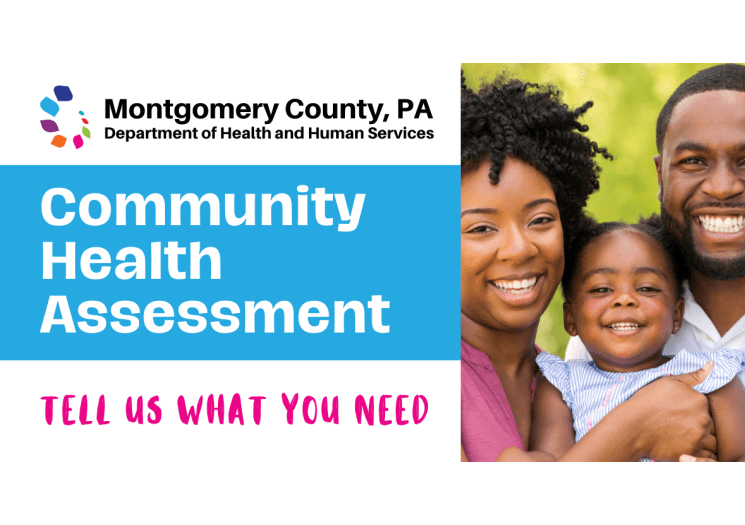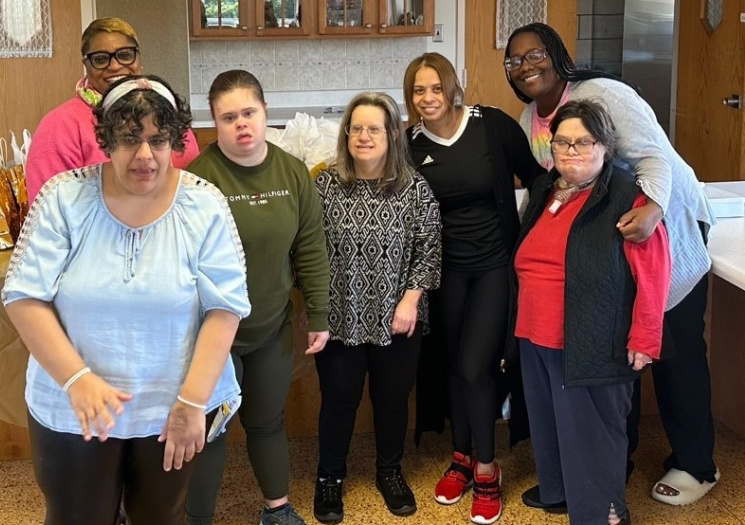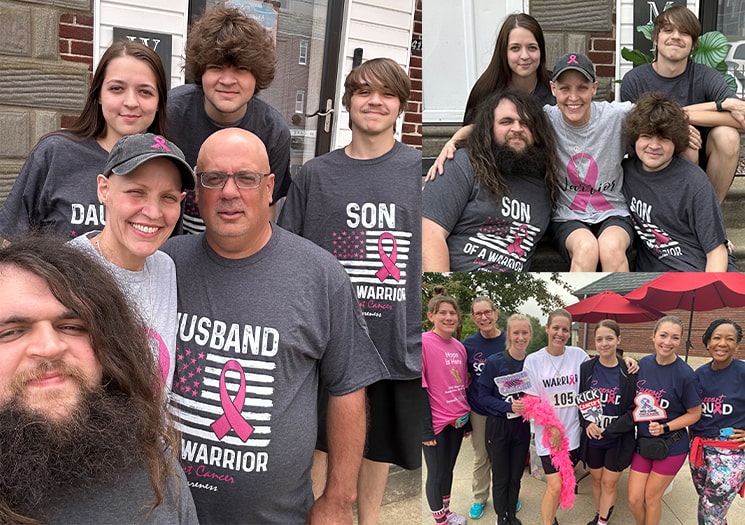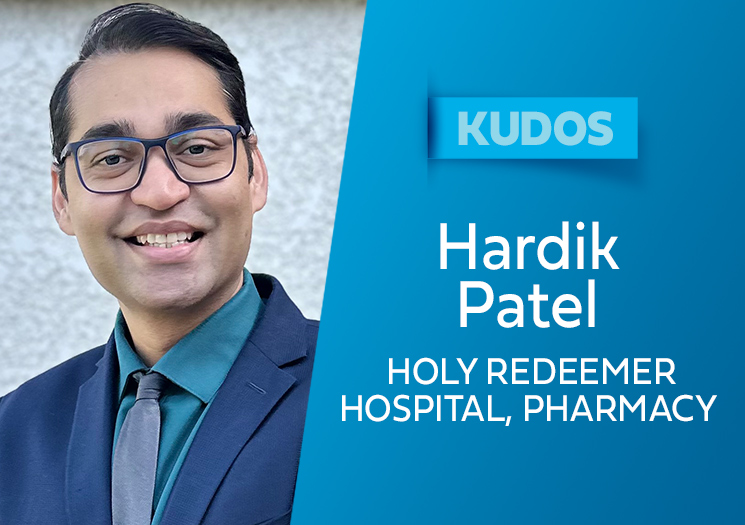- Find a Provider
-
Services
-
Redeemer Health provides compassionate care across every stage of life.
- View all Services
- Health Care
- Cancer Care
- Heart Care
- Hospital at Home
- Maternity Care
- Pediatric Urgent Care
- More Health Care Services
-
- Patients & Visitors
- Locations
- Careers
categories:
Redeemer Health Maternity is here with you throughout your most precious journey. From planning to become pregnant, to post-delivery, and beyond - our team of dedicated, experienced professionals are ready to assist.
Hear from a few moms who shared their experiences and offered words of advice with expectant moms!
Lilly, Mom and baby girl Kyla
 "My experience at Holy Redeemer Hospital was amazing! I loved meeting all the doctors and my nurse practitioner. The doctors always put my peace of mind and health first," said Lilly.
"My experience at Holy Redeemer Hospital was amazing! I loved meeting all the doctors and my nurse practitioner. The doctors always put my peace of mind and health first," said Lilly.
"I would advise expectant moms to be honest and open with their doctor always! When I struggled with post-partum depression, I felt ashamed. The doctors at Holy Redeemer Hospital made me feel comfortable enough to voice my concerns with them. It made it so that I was able to finally enjoy motherhood and my new baby!"
Elise, Mom and baby girl Anna

"I had the absolute best experience at Holy Redeemer Hospital. The doctors and nurses were absolutely phenomenal and made my whole delivery experience amazing. They knew how anxious I was, understanding that this was my first delivery. In spite of that, the room was filled with laughter and excitement the entire time. Everyone cheered me on as I was pushing - I loved it!" said Elise.
 Casey, Mom and baby box Jax
Casey, Mom and baby box Jax
"My experience overall at Holy Redeemer Hospital was absolutely amazing. I delivered my son via C-section and immediately after, I experienced an AFE (amniotic fluid embolism), DIC, kidney failure, and had to be intubated for over 24 hours. But with the amazing doctors and nurses at Holy Redeemer Hospital, I was given a second chance at life, and both myself and baby Jax are doing great!" said Casey.
"Being a Redeemer Mom is knowing that Jax and I were in the best hands possible for our care. Between the maternity doctors and nurses, ICU doctors and nurses, and the NICU doctors and nurses, everyone was absolutely amazing! The experience at Holy Redeemer Hospital is honestly the best!"
To find an OB/GYN near you, please click here. If you are expecting a new baby, be sure to visit RedeemerHealth.org/MaternityCare to take a virtual tour of Holy Redeemer Hospital's Labor and Delivery unit, access helpful educational resources and videos, and join our Redeemer Baby Online Community.
categories:

Effectively managing stress is key to a healthy lifestyle. Stress isn't just a mental state. In fact, constant stress can lead to increased levels of cortisol - the "stress hormone" - which in turn, can affect almost every system in your body.
Below are just some of the ways stress can be harmful to your health:
- Weight gain and obesity - Stress often triggers cravings for high-calorie, high-sugar comfort foods, which can lead to more stress on our bodies. Instead, choose a balanced diet with plenty of fruits and vegetables, whole grains, and lean proteins. It's also a good idea to restrict caffeine and alcohol consumption and to drink plenty of water and stay hydrated.
- Weakened immune system - Chronic stress can weaken the immune system, making it less effective at protecting the body from diseases. It can also worsen existing immune issues and contribute to inflammation, which impacts overall immunity.
- Cardiovascular issues - Stress can contribute to cardiovascular diseases such as increased levels of cholesterol, triglycerides, blood sugar, and blood pressure. Chronic stress can also lead to unhealthy habits like smoking, overeating, and lack of physical activity, all of which are risk factors for heart disease.
- Mental health issues - When left unmanaged or chronic, stress can lead to anxiety and depression, irritability, fatigue and emotional exhaustion, affecting mental health and overall well-being.
Physical Activity and Stress Management:
Exercise helps burn off stress hormones like adrenaline and cortisol, while at the same time triggering the release of endorphins, or natural mood enhancers. For the best results, try to schedule regular workouts such as a daily walk or a morning yoga routine. Adding variety to your workouts also helps, by keeping your body and mind engaged.
Restorative Sleep Helps Reduce Stress:
Getting enough quality sleep plays an important role in reducing stress. Establishing good sleeping habits like sticking to a consistent bedtime routine and eliminating distractions like light, noise, and other stimulating activities before bedtime can lead to better sleep quality and reduced stress.
The Power of Mindfulness in Stress Management:
Engaging in activities like yoga or tai chi can improve strength and flexibility while promoting mindfulness by focusing on breathing and movements. Deep breathing exercises, along with mindfulness meditation, can also aid in relaxation. Calming activities can help ease stress too. Examples include: keeping a stress journal, setting aside leisure time to yourself (e.g., taking a warm bath or getting a pedicure), taking a walk outside in nature, reading a book, or listening to relaxing music.
While these suggestions are all positive steps in the right direction, change can be overwhelming and often leaves us wondering how and where to start.
Click here for helpful suggestions on setting reasonable goals toward making important lifestyle changes.
Effectively managing stress through a combination of healthy nutrition, exercise, mindfulness activities, and quality sleep can benefit your overall health and well-being.
And remember, when it comes to making positive changes, diligence and patience are key! Take the time to write down your goals and review them regularly to help make long-term positive changes and create a healthier, stronger, happier you!
To find a doctor who is right for you, visit our provider directory or call the Redeemer Health Physician Referral Service at 1-800-818-4747.
Did you know, nutritional counseling services are available through a partnership with Simplex Health? To learn more, visit simplexhealth.com or call 1-877-842-2425.
categories:

If you are at least 18 years old and live in Montgomery County, the Office of Public Health wants to learn about your experiences, the health issues you care about, and your ideas to make our community healthier. Please share what matters most to you by filling out this confidential and anonymous Montgomery County Community Health Assessment survey.
Information collected through the Community Health Assessment will help create more opportunities for Montgomery County residents to achieve their best health. Results of this survey will be available to the whole community later this summer. More information about the Community Health Assessment is available here.
To learn more, click here to access Montgomery County's Community Health Assessment flyer, and share the following frequently asked questions:
What is a Community Health Assessment?
A Community Health Assessment (CHA) describes a community's health, needs, and the factors that contribute to health. The results paint a picture of the community's health and help show inequalities experienced. It also highlights the strengths and resources, such as libraries, open space, and community organizations.
Why should I participate?
Your voice is important. You can help us better understand the most important health issues facing you and our community. Your responses will help shape our Community Health Improvement Plan and the direction of public health in Montgomery County for years to come.
How long does the survey take?
The Community Health Assessment can take about 15 minutes to get the critical information we need to help improve health outcomes in Montgomery County.
How will this information be used?
The information collected will help us better understand the most important health issues facing our communities and develop a Community Health Improvement Plan prioritizing your needs.
Is this anonymous? Will you share my information?
Responses to the survey are anonymous. Your name and address will not be part of the survey so no responses can be traced to an individual.
When will you have the results? When will the CHA be completed?
Results of the completed CHA will be available in summer 2024. You can check back on this website for updates.
Who chose the questions for the survey?
The Montgomery County Office of Public Health has worked with a steering committee of 15 community partners and representatives from the Montgomery County Planning Commission and Health and Human Services offices to identify health priorities in communities in which they live, work, pray, and play. Concerns like stress, mental health and wellbeing, and the ability to navigate health systems were some of the health priorities identified. Questions were then drawn from community health assessments from other jurisdictions and from national surveys to help us understand our residents' perspectives and experiences in each of these priority areas.
Who do I contact if I have more questions?
Questions can be directed to publichealth@montgomerycountypa.gov or 610-278-5117.
Will I have access to the outcomes/results?
The results of the Community Health Assessment belong to everyone. If you would like to be notified when the results are published, please fill out this form. You can also check back on this website.
Can I share this information?
Yes! Please share the survey link or materials on the website with friends, family, and community members. Anyone 18 years of age or older who lives in Montgomery County is welcome to participate.
Who will see the data that is collected?
The Montgomery County Office of Public Health has contracted with consultants to help us with conducting surveys and focus groups. Individuals from those organizations and select members of the Office of Public Health will be responsible for assembling and analyzing the data.
How are you making sure to reach all populations in the county?
The Montgomery County Office of Public Health has the Community Health Assessment survey and promotional materials such as flyers available in the top 10 languages spoken in the County. Promotional materials and the survey link have been sent to numerous community organizations, shared with more than 13,000 residents who subscribe to the county's newsletter, and are available on our website and in printed form in various locations throughout the county.
Can I get a paper copy of the survey?
Paper surveys are available at your local library and at several other locations. If you are unable to get to one of these locations, please email publichealth@montgomerycountypa.gov.
categories:

March is Developmental Disabilities Awareness Month. Redeemer Health’s Intellectual and Developmental Disabilities (I/DD) program has been part of its mission for years. Maleita M. Olson, LCSW, is the executive director of Redeemer Health’s I/DD services, which currently houses five residents. Here, Maleita answers our questions and teaches us more about I/DD.
Redeemer Health: What does Developmental Disabilities Awareness month mean to you and/or your team?
Maleita: Developmental Disabilities Awareness Month represents an opportunity to share the many contributions that individuals with developmental disabilities (those with disabilities obtained before the age of 22) make in our community and to raise awareness about how the concept of disability has evolved over time. The Americans with Disabilities Act (ADA) was to the disability community what the Civil Rights Act of 1964 was to communities of color. For the first time, people began to understand that persons with disabilities deserved to have equal rights and equal access to everything everyone else has.
Pennsylvania turned that value into a philosophy, known as Everyday Lives, informing how we all approach the movement toward further inclusion of persons with disabilities into society. Kristen Ehrens, Deputy Secretary of the Office of Developmental Programs, said, “Everyday Lives guides us in our commitment to help create a world that embraces and celebrates human differences, a world in which everyone can experience belonging.” I appreciate the opportunity to partner and interact with the staff and individuals on a regular basis to help make that vision a reality.
To me this month is about helping others recognize that those individuals in our community with developmental disabilities may have special needs, but they have ordinary, “everyday” dreams and desires.
As the Everyday Lives philosophy emphasizes, “an everyday life is about opportunities, relationships, rights, and responsibilities. It is about being a member of the community, having a valued role, making a contribution to society, and having one's rights as a citizen fully respected. It is a vision that we should all be working toward together.”
Redeemer Health: How do your residents celebrate this month?
Maleita: We mark the end of the month with a party, inviting family, friends and members of the community. We take time to reflect on the many accomplishments each person we support has made in the last year and celebrate people that have chosen to work in this field, not just as a job, but as a career.
Redeemer Health: Please tell us more about Redeemer Health’s I/DD program.
Maleita: The Intellectual/Developmental Disabilities (I/DD) program emerged from the hearts of the Sisters of the Redeemer, who were asked repeatedly to support this vulnerable population. In 2017, Redeemer Health opened its first licensed home, Reilly House, serving three individuals with intellectual disabilities. In 2021, we opened our second licensed home, serving an additional three individuals. Both homes are in close proximity to the main Redeemer Health campus in Huntingdon Valley.
In 2022, we launched a day program to provide structure and community integration activities for the individuals we serve, with a plan for further outreach. These efforts have been supported by a generous grant from Senator Maria Collette, which recently gave us the opportunity to purchase a handicapped accessible van, a specialized interactive learning system, furniture and specialized training for our staff.
Redeemer Health is uniquely situated with health care resources to support this population, maintaining healthy lives and working toward fulfilling their potential. We are working to expand our support to all families touched by disability, including those with loved ones still living at home.
Redeemer Health: What about your work makes you most proud?
Maleita: It is a privilege to journey with people with disabilities and to increase opportunities for them to grow. They encourage me, our team, and those they come in contact with every day to become the very best versions of ourselves. They have so much to teach us about humility, resilience and focusing on the aspects of life that are really important. Many of them have a beautiful love of and faith in God and Jesus, which is contagious. I am proud of seeing the mutual growth that our residents and team inspire in each other.
One of the proudest accomplishments in the last year was creating volunteer opportunities for our individuals to work at Spark and Redeemer Valley Farm. The goal is not for them to just be “in” the community, but “of” the community. The way the community at Spark have embraced and welcomed them truly embodies Redeemer values.
Maleita M. Olson, LCSW, has been executive director of Redeemer Health’s I/DD program since 2020. She has a bachelor’s degree in psychology and a master’s degree in social work, both from Boston College. Maleita is a behavioral specialist, social worker, therapist and consultant.
categories:

In just under 60 seconds, a simple device with electrodes made it possible for Danni to avoid lifelong lymphedema after her double mastectomy.
Danni Blauser, an active nurse, wife, and mother, discovered a lump in her armpit. Having had a mammogram six months earlier, she wasn't immediately concerned. But when the lump grew, she sought medical attention and was sent for a subsequent mammogram and ultrasound.
Just two days later, Danni underwent a breast biopsy, performed by Dr. Stacy Krisher, Medical Director of the Breast Health Program at Redeemer Health in partnership with MD Anderson Cancer Center at Cooper.
The diagnosis revealed breast cancer, leading to a treatment plan that included a double mastectomy, reconstructive surgery, chemotherapy and radiation therapy. Following her mastectomy, Danni developed cording (or banding) in her lymph nodes, restricting movement in her left arm.
A common concern after breast surgery, lymphedema, or abnormal swelling, occurs when the natural flow of lymphatic drainage is disrupted, leading to the buildup of protein-rich fluid. It usually occurs in the arm or hand on the side where the breast surgery was performed.
Thanks to early intervention and vigilant monitoring, a standard that differentiates the Breast Health Program, Danni's journey took a fortunate turn. With the use of a non-invasive digital tool that detects lymphedema before fluid builds up and symptoms become recognizable, Danni's condition was identified at its earliest stage - while it was still reversible.
Danni wore a compression sleeve every day for a month and also went for lymphedema therapy, which improved her range of motion. She still keeps up with stretch exercises at home and continues to get regular assessments to make sure her numbers remain at pre-surgery levels.
Without the proactive monitoring and detection of lymphedema when reversal was still possible, Danni's story could have taken quite a different path.
She continues to improve every day, occasionally wearing the compression sleeve for support and being extra careful not to get cuts, scratches, or injections in that arm.
Danni is grateful for the vigilance and continuous monitoring she received throughout her breast health journey. Even more important, she is thankful for the simple, non-invasive device that saved her from experiencing life-long chronic lymphedema.
With hope in her heart and a positive outlook toward the future, Danni remains the best mom, wife, and nurse to all who need her!
Learn more about breast cancer services at Redeemer Health in partnership with MD Anderson Cancer Center at Cooper.
categories:

MEADOWBROOK, Pa. - March 20, 2024 - Holy Redeemer Hospital has been awarded a PSQH Innovation Award for its study on quality improvement and infection prevention to overcome patient safety challenges, particularly in the field of antimicrobial stewardship program (ASP). ASPs are critical initiatives designed to prevent unnecessary antibiotic use and reduce antibiotic resistance.
Hardik H. Patel (HH), PharmD, MHA, BCPS, senior pharmacy clinical coordinator at Redeemer Health, led the study focused on evaluating the impact of antimicrobial stewardship practices in treating Escherichia coli (E. coli) bacteremia in both non-ICU and ICU settings. It was conducted at Holy Redeemer Hospital between July 2021 and July 2022 and involved patients aged 18 and older, admitted to the hospital with positive blood cultures for E. coli.
The post-implementation initiatives made an impactful difference in improving patient care at the hospital. Key achievements include:
- Reduced Hospital Stays: Patients benefited from shorter hospital stays, with notable differences between ICU and non-ICU settings, underscoring the effectiveness of targeted interventions.
- Smart Antibiotic Use: Through strategic antibiotic de-escalation, the hospital has demonstrated a commitment to combating antibiotic resistance, with a 61% success rate in reducing the use of broad-spectrum antibiotics.
- Advanced Diagnostic Tools Improve Patient Care: By using procalcitonin monitoring to figure out how serious a bacterial infection is and blood tests to identify the specific bacteria causing the infection, doctors at Holy Redeemer Hospital made timely and precise adjustments to treatment plans, ensuring patients receive the most effective care promptly.
These accomplishments highlight Redeemer Health's dedication to pioneering patient care and antibiotic stewardship. The study not only presents a blueprint for managing infectious diseases during challenging times but also sets a new standard for hospitals in the region.
"By harnessing the collective expertise and passion of health care professionals from various disciplines, this project certainly inspired me to unlock possibilities in patient care, ultimately transforming lives beyond the walls of the pharmacy through research," said Dr. Patel. "Leading meaningful projects in the field of infectious diseases and prioritizing what matters to patients, providers, and payers - such as decreasing length of stays at the hospital - makes me proud to showcase our robust clinical leadership and the value of our health system in the community."
For more information about Patient Safety & Quality Healthcare (PSQH), and Dr. Patel's findings, visit the PSQH site here.
categories:

By Leigh Gerson, DO, Colorectal Surgeon at Redeemer Health in partnership with
MD Anderson Cancer Center at Cooper
Did you know that colorectal cancer is the third most commonly diagnosed type of cancer in both men and women over 45? Knowing the facts about early diagnosis and treatment, as well as having conversations with your family or primary care doctor about screenings, are two important steps you can take to help reduce risk.
Tips to Lower Your Risk
Living a healthy lifestyle can help decrease your chances of developing colorectal cancer. This includes taking steps like:
- Maintaining a healthy weight
- Avoiding smoking
- Limiting alcohol consumption
- Engaging in regular physical activity
- Maintaining a balanced diet that includes lots of fresh fruits, vegetables and whole grains, while limiting processed meats
Additionally, if you have family members diagnosed with colorectal cancer or certain inflammatory bowel diseases like ulcerative colitis or Crohn's disease (especially over age 45), be aware that this could put you at greater risk - so take extra care!
Know the Signs and Symptoms
Some common signs and symptoms of colorectal cancer include:
- Feeling tired
- Having a change in weight
- Bloating/gas/constipation/diarrhea lasting more than 4 weeks
- Blood in your stool (which may look like black tarry stools)
- Rectal bleeding
If you have any of these symptoms that last more than 4 weeks, it is important to consult your family doctor or primary care physician.
Screenings Play an Important Role in the Detection of Colorectal Cancer
Talk with your doctor about which is the best colorectal cancer screening for you. Tests that are used to examine the inside of the large intestine (colon) and rectum, tests that can detect hidden blood in the stool, or screenings that can identify genetic changes in the cells of the colon could all be possibilities, depending on your age and individual risk factors.
Take Control of Your Colorectal Health
Your family doctor or primary care physician can help you understand your risk factors and what you can do to protect yourself from colorectal cancer. They can also provide guidance on when you should get screened. Don't wait until something is wrong to see your doctor - make sure you stay on top of your colorectal health and get the peace of mind that comes with knowing you're doing everything you can to protect yourself.
To find a Redeemer Health family doctor or primary care physician, call 800-818-4747 or visit the Redeemer Health website.
Watch Our Webinar - The Power of Prevention: Colorectal Health and Wellness
In this webinar, Leigh Gerson, DO will share the latest screening guidelines, risk factors, and other useful tips and strategies for improving colorectal health. Watch here.
About the Author: Dr. Leigh Gerson is a colorectal surgeon, focusing on the treatment of colon and rectal cancer. She is experienced in both traditional colorectal surgery and minimally invasive surgery, including robotic-assisted techniques. She also performs colonoscopies and other anorectal procedures. Dr. Gerson takes time to answer questions so those in her care can be comfortable with their treatment. Dr. Gerson sees patients at both Redeemer Health Surgical Associates and Redeemer Health in partnership with MD Anderson Cancer Center at Cooper.
categories:

Navigating Your Choices
Exploring the prospect of transitioning to an independent living community is not merely a financial consideration but a journey into a lifestyle filled with unique benefits.
Amidst the financial landscape, two prevalent options often emerge— the monthly rental and entrance fees. Navigating these choices demands a nuanced understanding of their distinct advantages, ensuring you’re well-equipped to make a thoughtful and informed decision about your future living arrangements.
Stress-Free Retirement with Rental Options
One of the main benefits of renting in an independent living community, such as The Lafayette, a Redeemer Senior Living community, is that there is no large upfront payment required. This means your savings can remain intact for other personal expenses if needed.
Moreover, the monthly rent for modern, well-designed apartments for seniors in an independent living community typically covers utilities, meals, housekeeping, maintenance, and access to community amenities and activities. This simplifies budgeting as you won't encounter unexpected costs each month
For example, at The Lafayette, the monthly fee includes most utilities, weekly housekeeping, daily restaurant-style dining, scheduled transportation for shopping and doctor appointments, social and recreational events and activities, and an inclusive spiritual life program that accommodates many faiths.
According to Robin Heppler, Director of Sales at The Lafayette, the rental fee option has gained popularity among residents. Robin explains, “Many people value the convenience and simplicity it offers. The monthly rental fee allows residents to enjoy all our amenities and services in one inclusive fee."
Robin believes this option appeals to individuals who prefer straightforward financial planning and appreciate the flexibility to reassess their living arrangements as needs change. "Ultimately," she says, "it aligns seamlessly with our goal of providing an enjoyable retirement experience free from stress."
Navigating Entrance Fees in Senior Living
In contrast to the monthly fee, choosing an entrance fee requires an upfront cost. However, if needed, the cost usually guarantees priority access to higher levels of care within the same community, such as personal care, short-term rehab, or long-term care. Additionally, compared to the rental fee option, the monthly fees are usually lower. Over time, this can lead to significant savings. Some communities even offer partial or full refunds when you leave, benefiting you or your estate.
For instance, at The Lafayette, an affordable initial investment not only results in a reduced monthly rent but also guarantees priority access to services within Redeemer Health for as long as you stay in your independent living apartment. And, of course, a full range of services and amenities including those mentioned above are encompassed within the lower monthly fee. Additionally, when you eventually leave, at least 50% of your initial investment will be returned.
Robin often finds that a refundable entrance fee is a great fit for residents who are mindful of legacy planning. "This option allows residents to preserve a portion of their estate for their heirs," she explains. "It strikes a thoughtful balance between ensuring a resident’s comfort and well-being during retirement and leaving behind a financial legacy for loved ones."
Explore Payment Options that Are Best for You
Choosing between senior living payment options depends on your unique circumstances and financial situation. Both options have advantages and offer value for your independent living lifestyle in different ways.
At The Lafayette, we encourage you to reach out to us to discuss your unique situation. Our senior living team is ready to provide more information and guidance so that you can make the best decision. You deserve a fulfilling retirement free from worries, and understanding your senior living financial options is the first step toward achieving this goal.
To learn more visit Redeemer Senior Living or speak directly with a sales specialist by calling 215-214-2877. Our Redeemer Senior Living sales counselors would love to hear from you!
categories:

By Samuel J. Needles, MD, OB-GYN at Redeemer Health
The role an obstetrician-gynecologist (OB-GYN) plays in a woman's health journey is important from adolescence to adulthood. Even more important is finding the right OB-GYN to make sure you get the care you deserve.
Understanding the Role of an OB-GYN
An OB-GYN is a medical professional who specializes in the field of women's reproductive health. OB-GYNs are trained to provide comprehensive health care services related to both obstetrics (pregnancy, childbirth, and postpartum care) and gynecology (the female reproductive system, including the diagnosis and treatment of disorders).
OB-GYNs are skilled in diagnosing and treating a variety of conditions, from routine check-ups to more complex issues such as infertility, pelvic pain, and sexually transmitted infections (STIs). They provide services that span a woman’s lifetime, such as: Pap smears and HPV (human papillomavirus) testing, breast exams, sexually transmitted disease (STD) screenings, fertility testing and treatment, pregnancy care, and menopause management, to name a few. Many OB-GYNs are also highly trained in a variety of surgical options to manage a variety of women’s health concerns. OB-GYNs use their training and experience to help educate and guide patients, empowering them to make informed decisions based on their individual situation.
Making Sure You Choose the Right OB-GYN
Choosing the right OB-GYN is important for your overall health and well-being. Be sure to find an OB-GYN who makes you feel comfortable, someone you can talk with openly about your health concerns and who provides quality care.
Factors to consider when choosing an OB-GYN include:
- Location: Is the provider located near me? If you are pregnant or planning to become pregnant, it's also important to know where your newborn will be delivered.
- Insurance: Does the provider accept your insurance?
- Communication: Does the provider listen to your questions and concerns?
- Comfort: Do you feel comfortable with the provider and their bedside manner?
- Experience: Does the provider have experience in treating your specific needs?
How Often Should I See My OB-GYN?
Regular gynecological exams and preventative care are critical in maintaining reproductive and overall health. You should also see an OB-GYN if you experience any abnormal symptoms or concerns, such as: irregular periods, painful periods, abnormal discharge, pain during sex, bleeding between periods, or concerns related to fertility or pregnancy.
Building a relationship with your OB-GYN can play a key role in your well-being. Seeing the same provider for routine check-ups and prevention helps them get to know you and your health history. It also helps in providing you with personalized care and catching any potential health concerns before they become more serious.
Most women will have a recommended visit annually with their OB-GYN, with the care tailored to address their specific health needs, life stage, and individual goals.
For adolescents, the American College of Obstetricians and Gynecologists (ACOG) recommends that girls first see an OB-GYN when they're between the ages of 13 and 15. Most girls will not need a pelvic exam during this first visit. Many providers will simply perform a regular health exam and talk with the patient about her development.
Taking the Next Step
Regardless of your life stage, finding the right OB-GYN is important in maintaining your overall health and well-being. Don't be afraid to ask your provider questions or bring up any concerns you may have. A good OB-GYN will listen to your needs and work with you to create a personalized care plan that's right for you.
To find a Redeemer Health OB-GYN near you, call our Physician Referral Service at 800-818-4747 or visit the Redeemer Health website.
If you are expecting a new baby, be sure to visit RedeemerHealth.org/MaternityCare to take a virtual tour of Holy Redeemer Hospital's Labor and Delivery unit, access helpful educational resources and videos, and join our Redeemer Baby Online Community.
About the Author: Dr. Samuel J. Needles is an Obstetrician and Gynecologist (OB-GYN) specializing in pregnancy, childbirth, and women's reproductive health. He received his medical degree from Sidney Kimmel Medical College at Thomas Jefferson University. Dr. Needles currently sees patients at Kramer OB-GYN and Associates, a Redeemer Health practice providing complete obstetrical and gynecological care.
